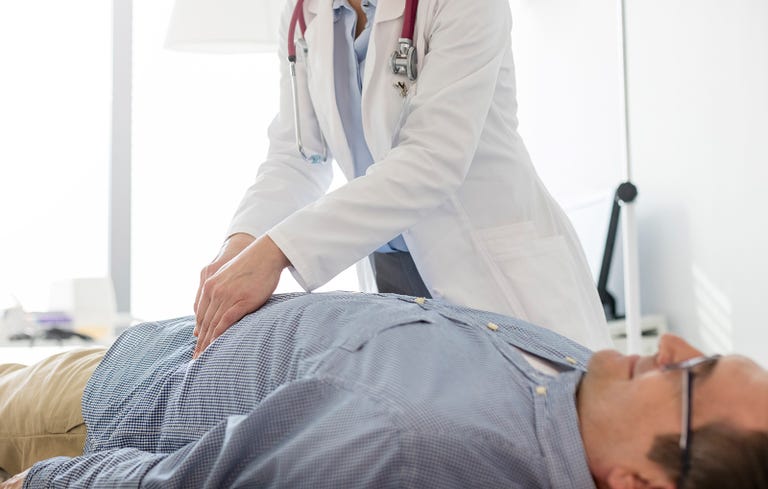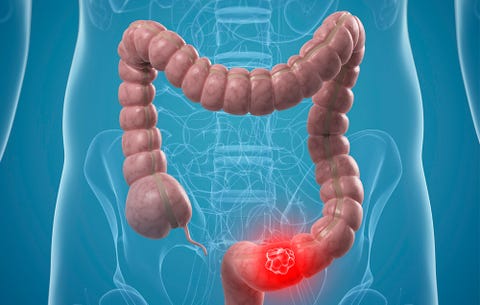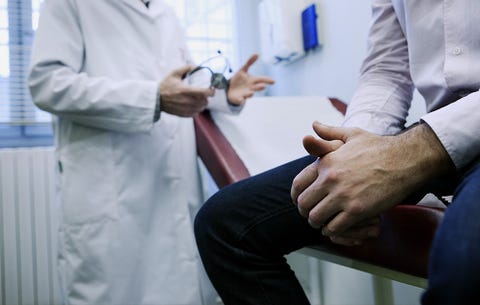Your First Colon Cancer Screening Should Happen Earlier Than You Think

Friendly reminder: It’s probably time for you to get an annual physical. And, if you’re 45 or older, make sure to get a colon and rectal cancer screening, too.
On Wednesday, the American Cancer Society released updated guidelines for colon and rectal cancer screenings. In it, the group now recommends that adults with an average risk of cancer get screened starting at age 45 instead of age 50.

Getty Images
The revised age limits released by the group come on the heels of a still-unexplained rise in colon and rectal cancers in younger people, even as young as teens. Because the group cannot explain the rising trend, it simply hopes more people will begin the screening process earlier in life.
“People born in the ‘80s and ‘90s are at double the risk for developing cancer of the colon and four times the risk for developing cancer of the rectum compared to people born decades earlier like the ‘40s and ‘50s,” Dr. Richard Wender, chief cancer control officer for the American Cancer Society, told NBC. “We’re actually seeing colorectal cancer developing in people in their teens, which is something that was extraordinarily rare in the past, and it’s all too common today.”
The updated guideline is based in part on new data that show a 51% increase in colorectal cancer among those under age 50 since 1994. To learn more, visit https://t.co/OSPWQOQ4TF
As NBC pointed out, colorectal cancer is the third most commonly diagnosed cancer in Americans. This year alone, the American Cancer Society expects more than 95,000 people will be diagnosed with colon cancer, while 40,000 more will be diagnosed with rectal cancer. Combined, these two cancers will kill an estimated 50,000 people in 2018.
A majority of Americans fall within those “average risk” guidelines, according to Wender.
“If you have a family history or if you have inflammatory bowel disease, you’re at higher risk and you need to start earlier. These guidelines don’t apply to you,” Wender said. “But for 80 percent of us — we’re at average risk, and the screening age is now 45.”

Getty Images
What happens at a colorectal cancer screening?
A colorectal cancer screening can mean a multitude of things, including, but not limited to: A colonoscopy, where a small camera is inserted and snaked through the entire colon; DNA testing on stool to check for cancerous cells; CT scans; and blood tests.
Testing can be expensive, especially if it’s not currently covered by insurance.
“Right now, all insurance is mandated to cover colonoscopy — all the screening options — at age 50. That’s not going be true the moment we release this guideline,” Wender told NBC. “So we’re going to be working on insurance coverage over the next five years to make sure these options are available to everyone.”

Shutterstock
How to prevent colorectal cancer — beyond regular check-ups
CNN reported that a separate study released last week by the World Cancer Research Fund, in collaboration with the American Institute for Cancer Research, found that being physically active and eating healthfully — including plenty of foods high in fiber — can potentially decrease your risk of colorectal cancer.
Moreover, limiting your consumption of red meat, processed meat, and alcoholic beverages could further decrease your risk of these deadly cancers. (Don’t worry, we promise eating less meat isn’t hard. Here are a few veggie-friendly meals to try out this week to get you started.)
To learn more, read up on these 7 signs of colon cancer you should never ignore.
Source: Read Full Article


